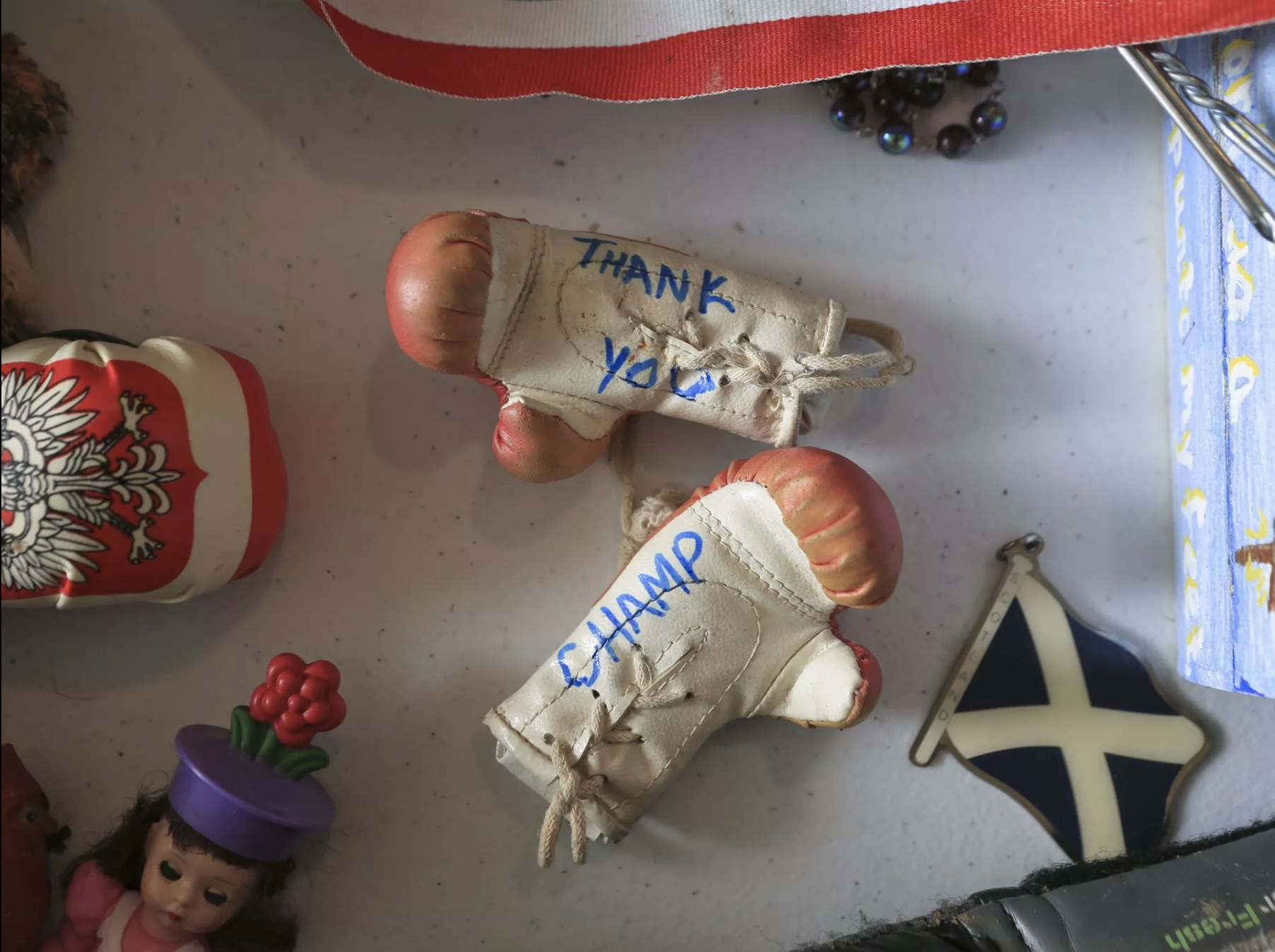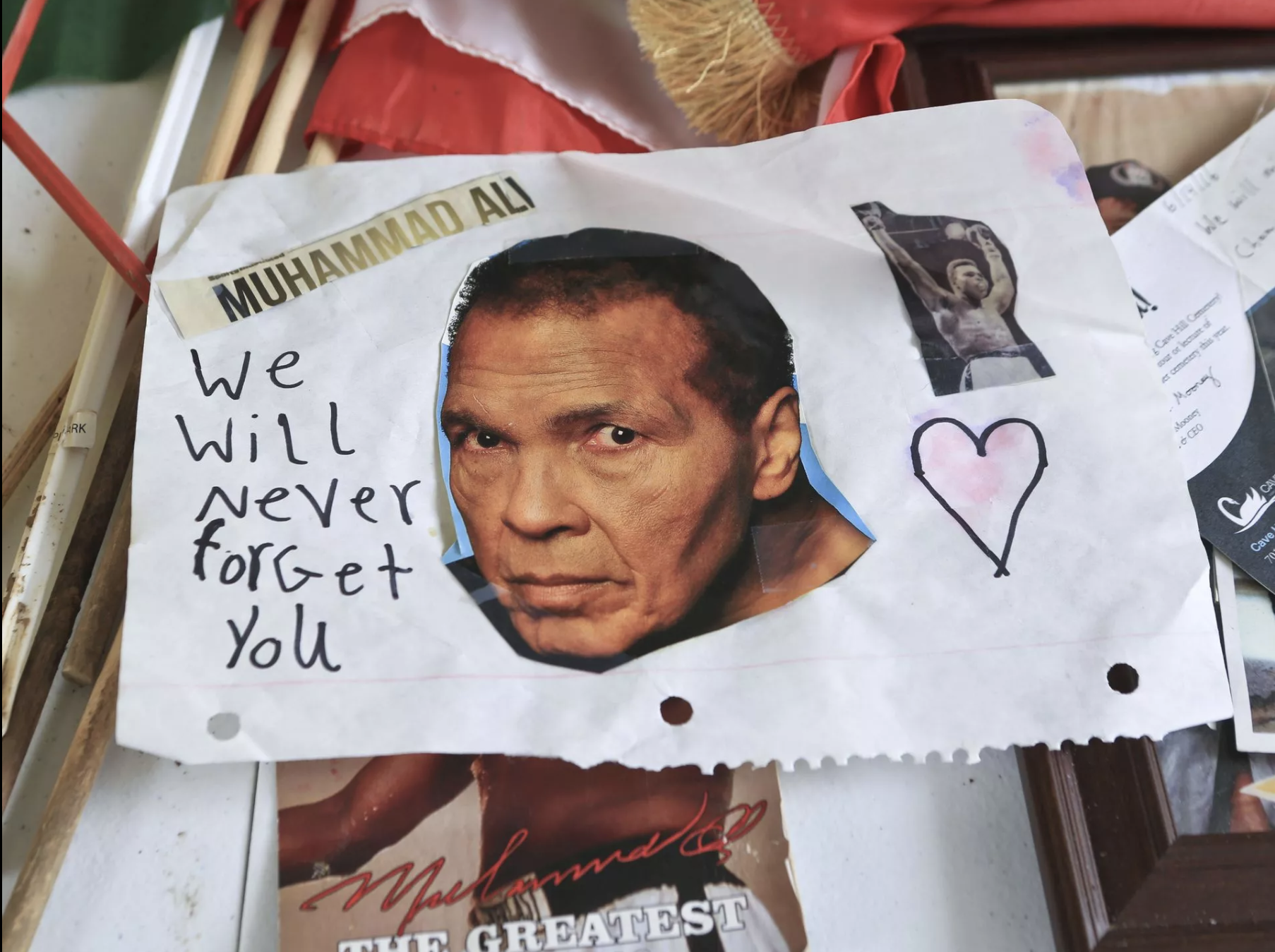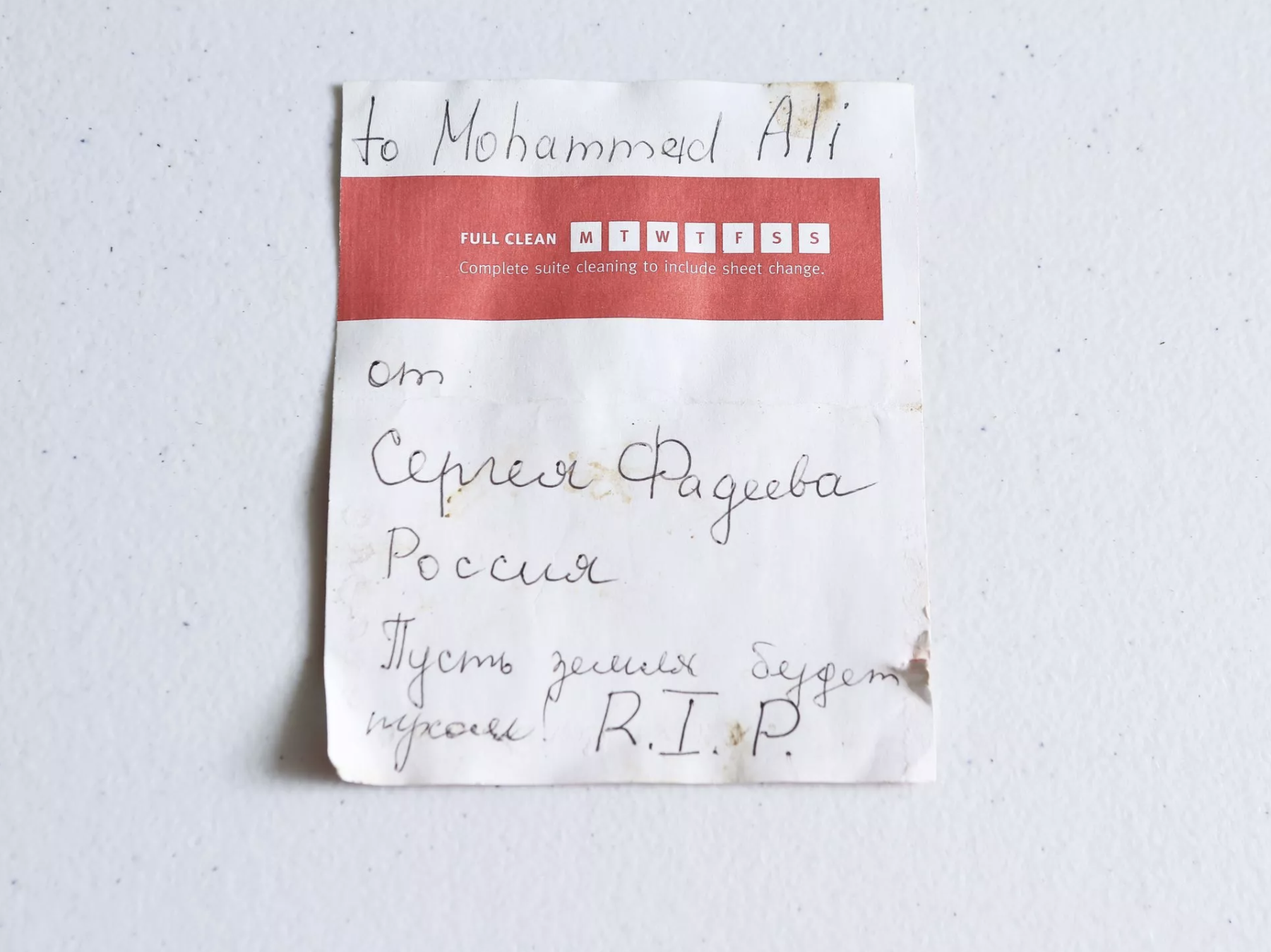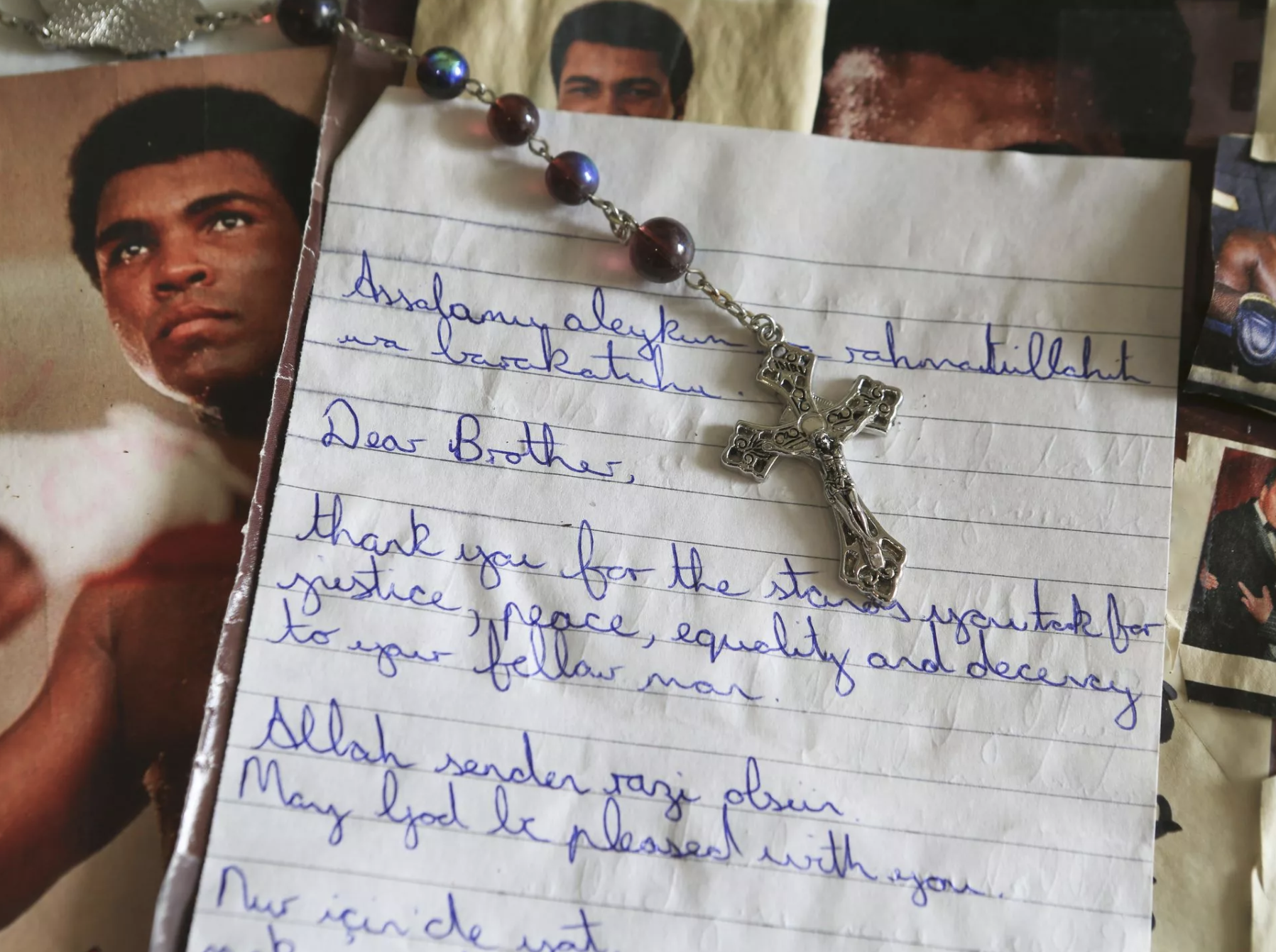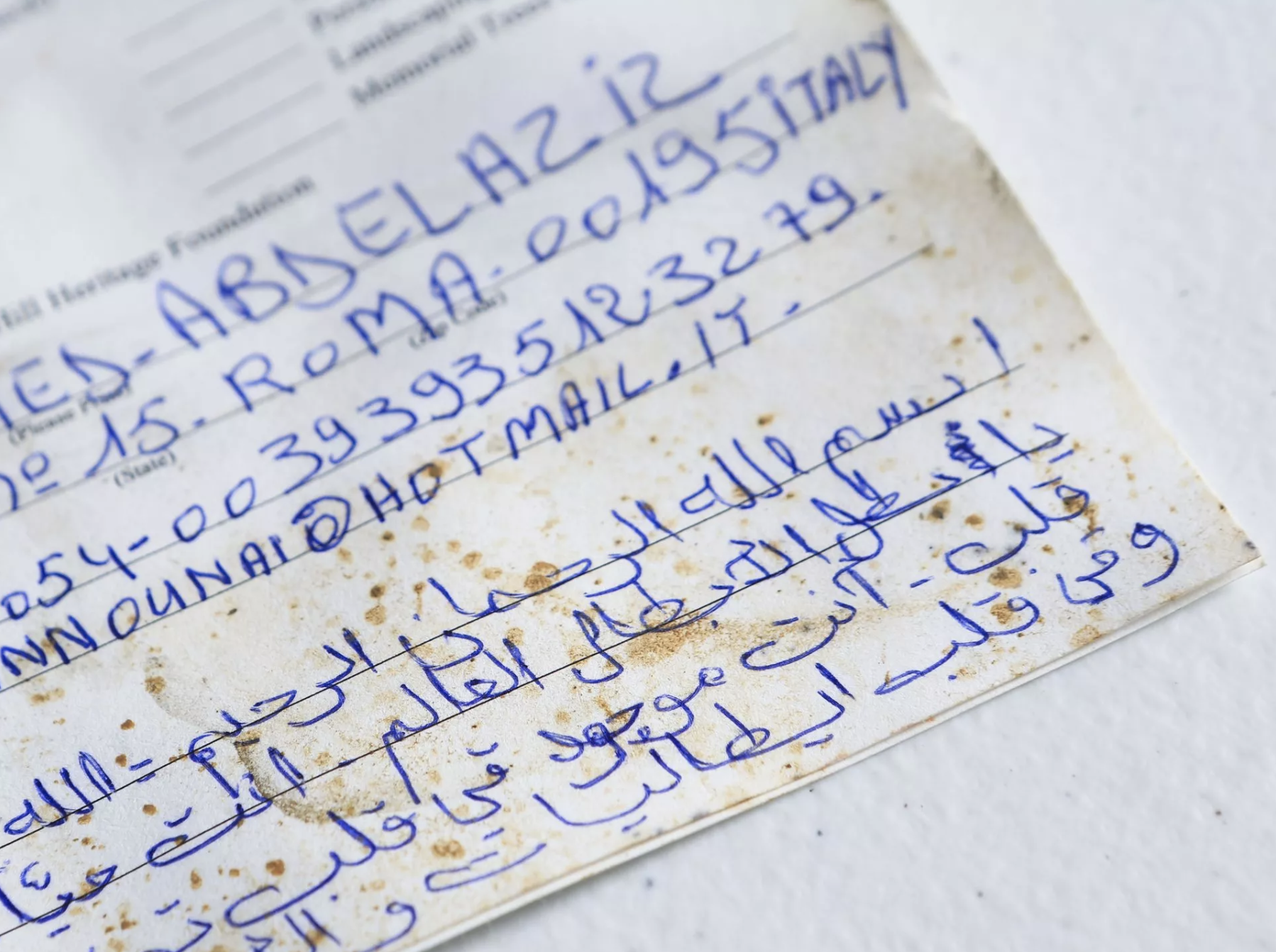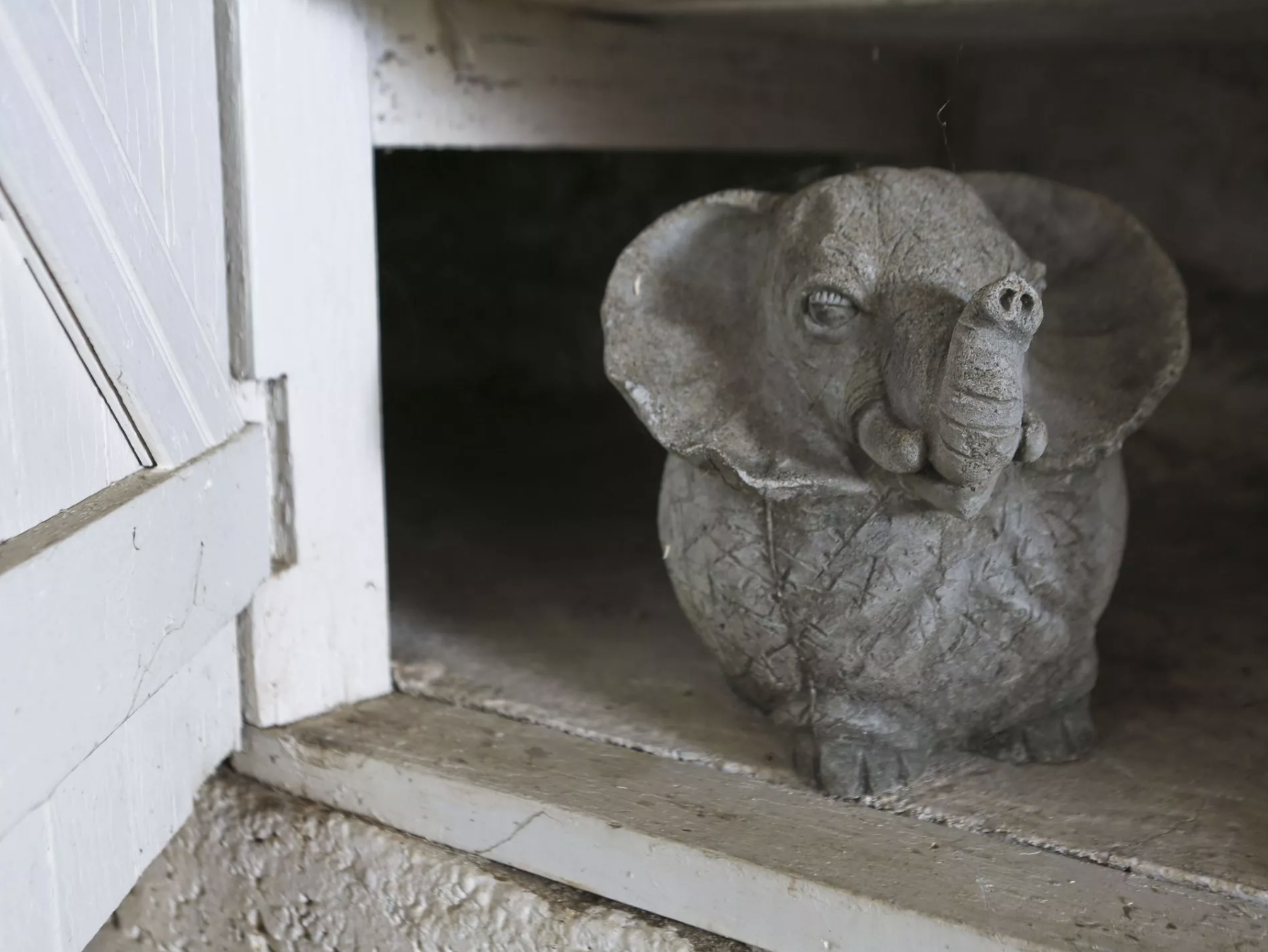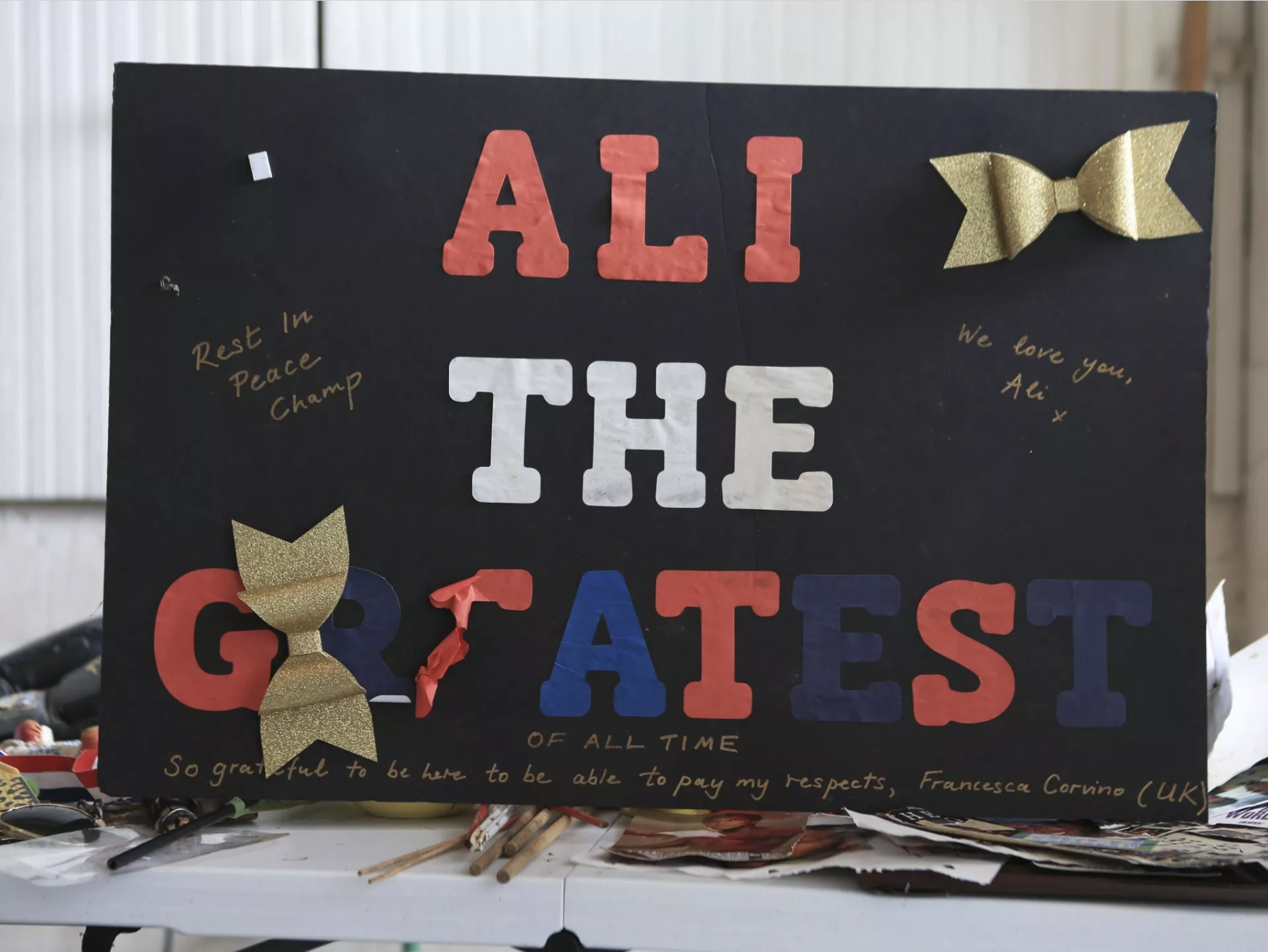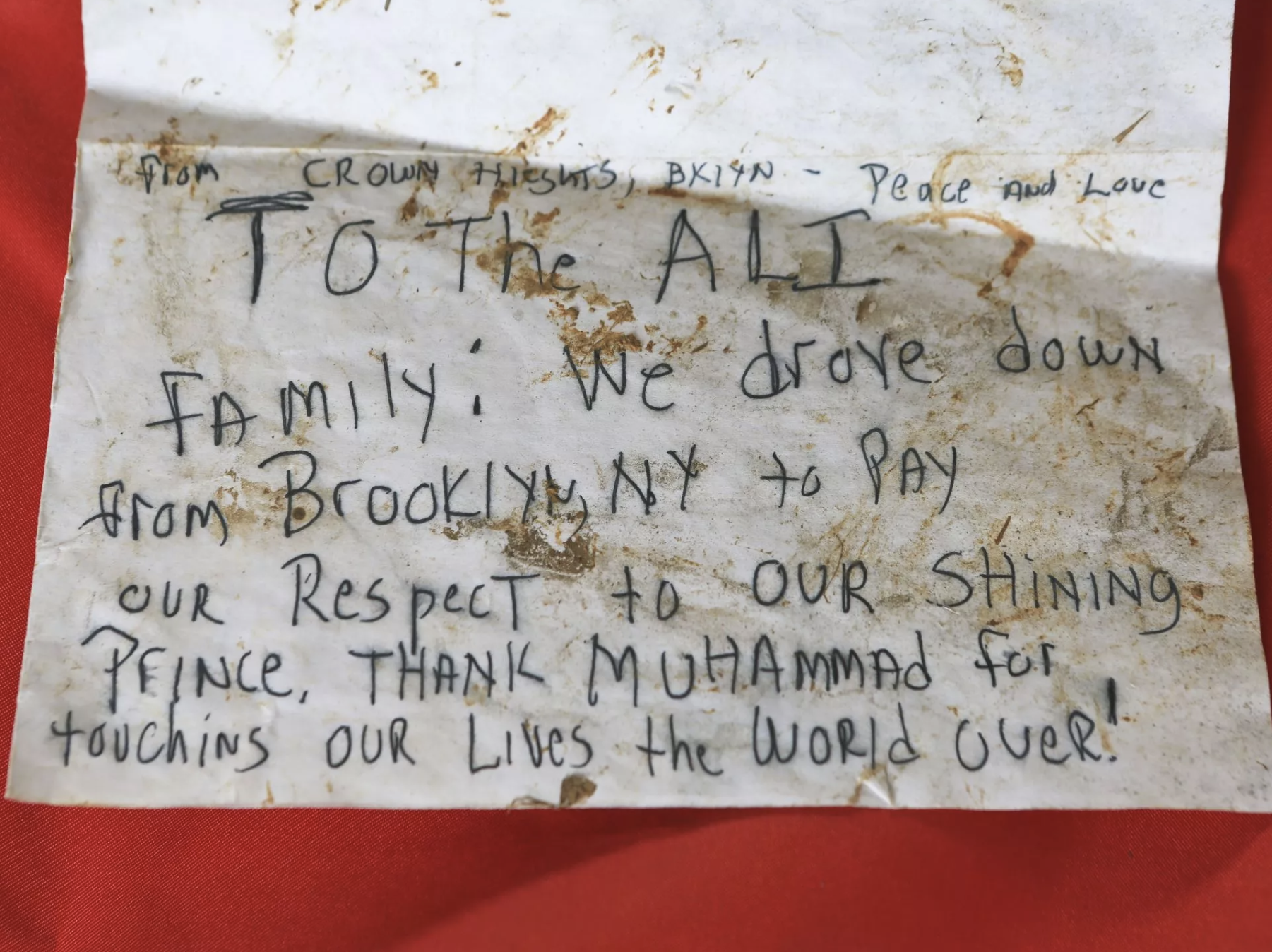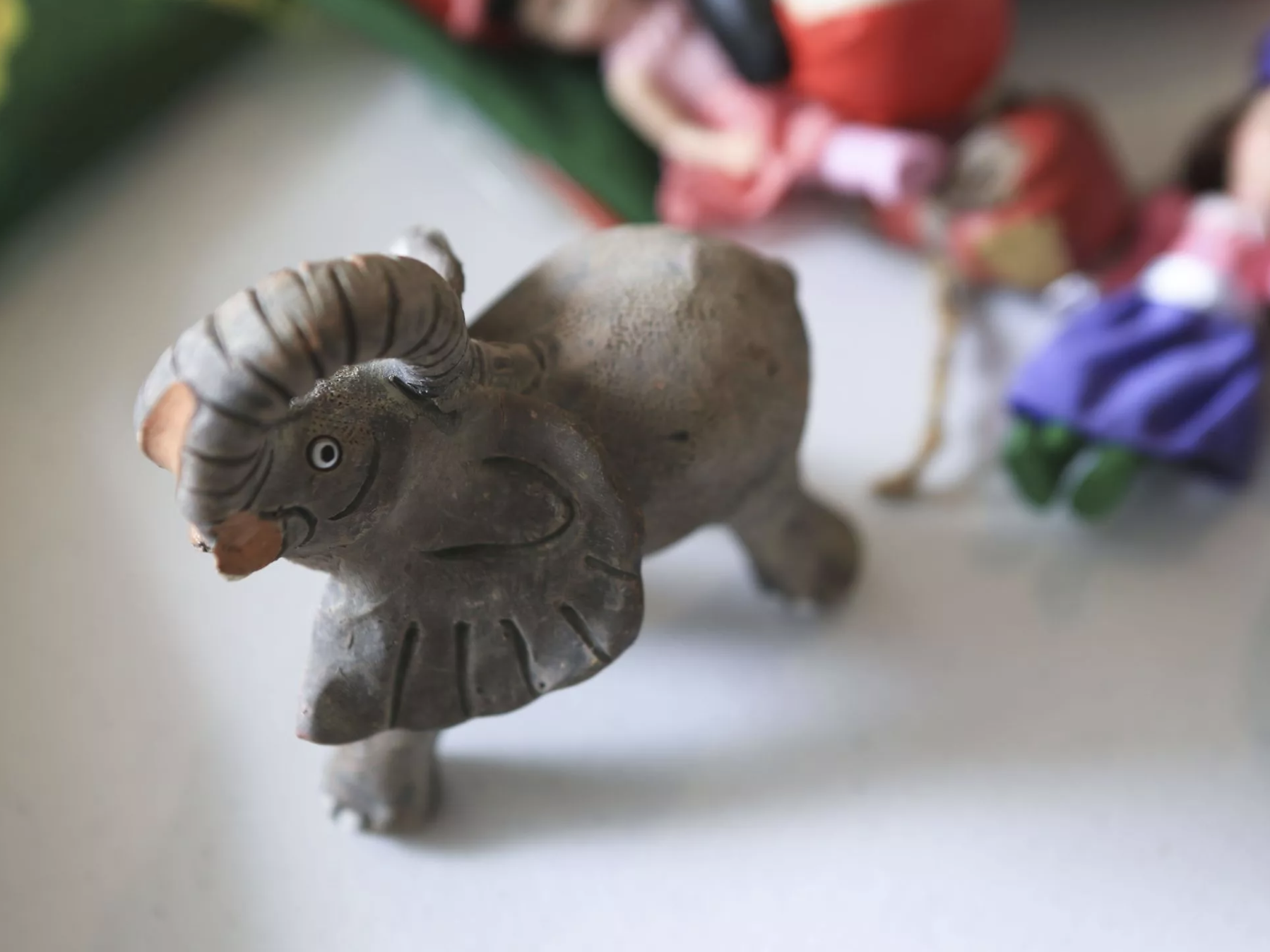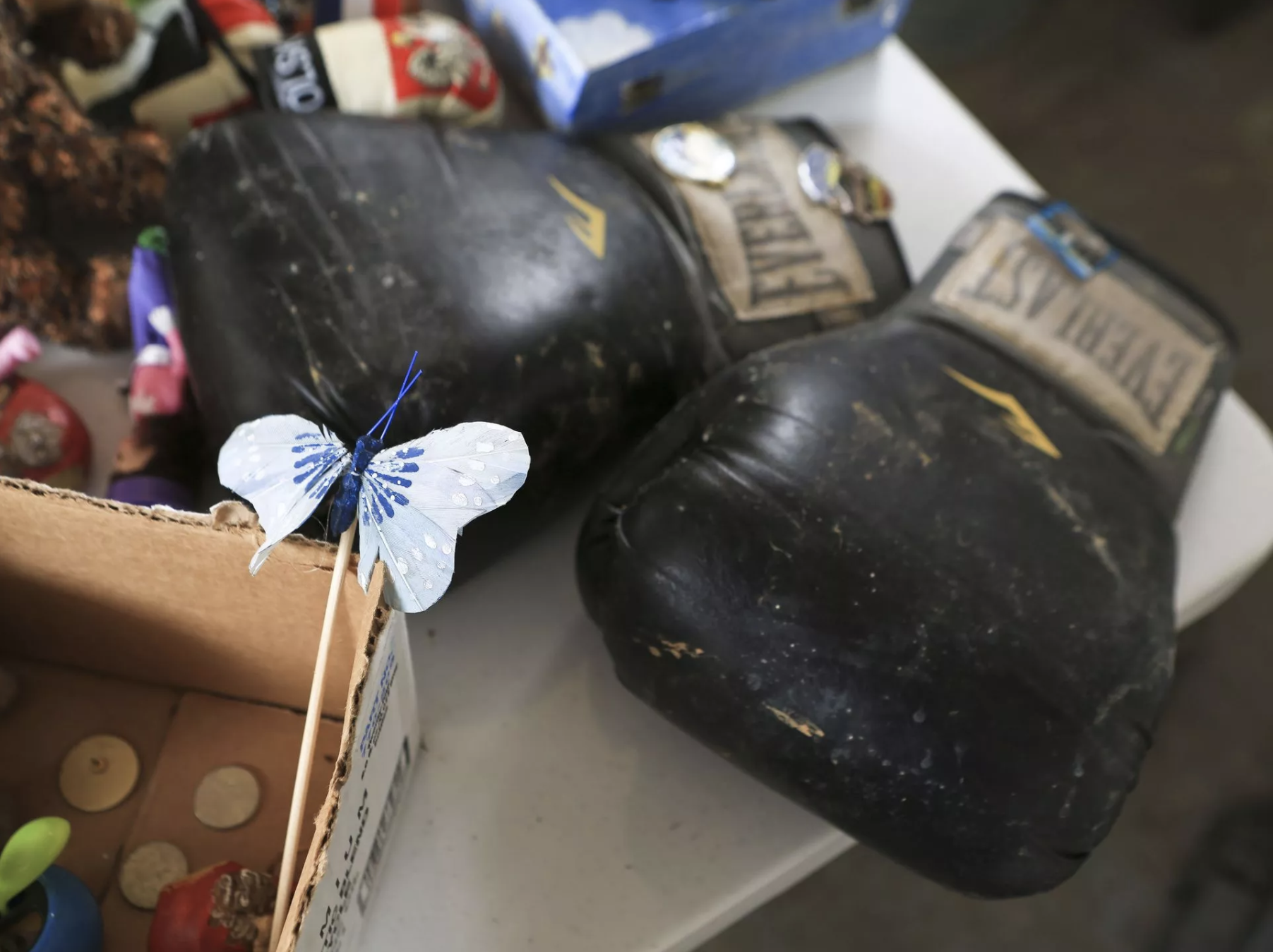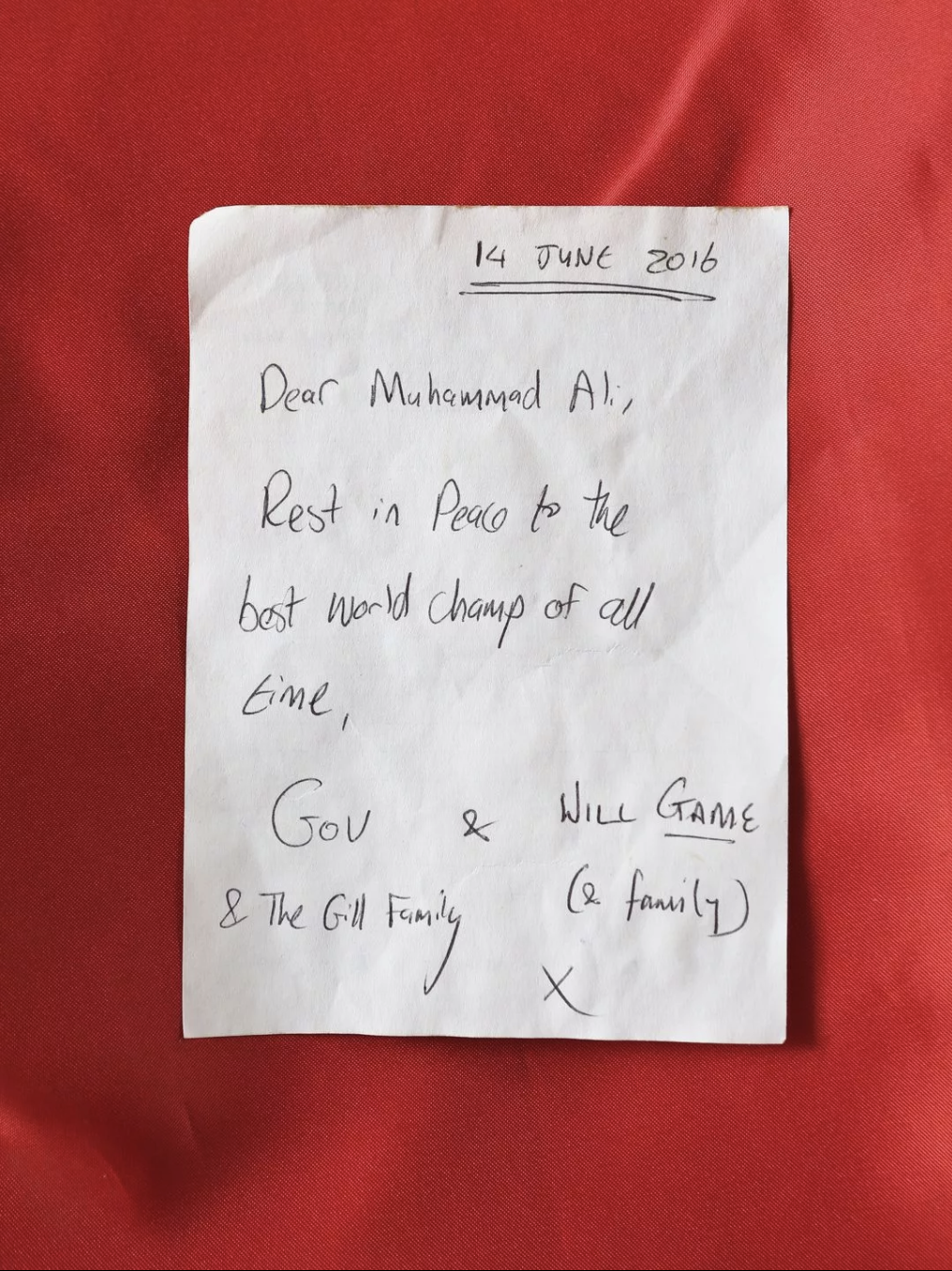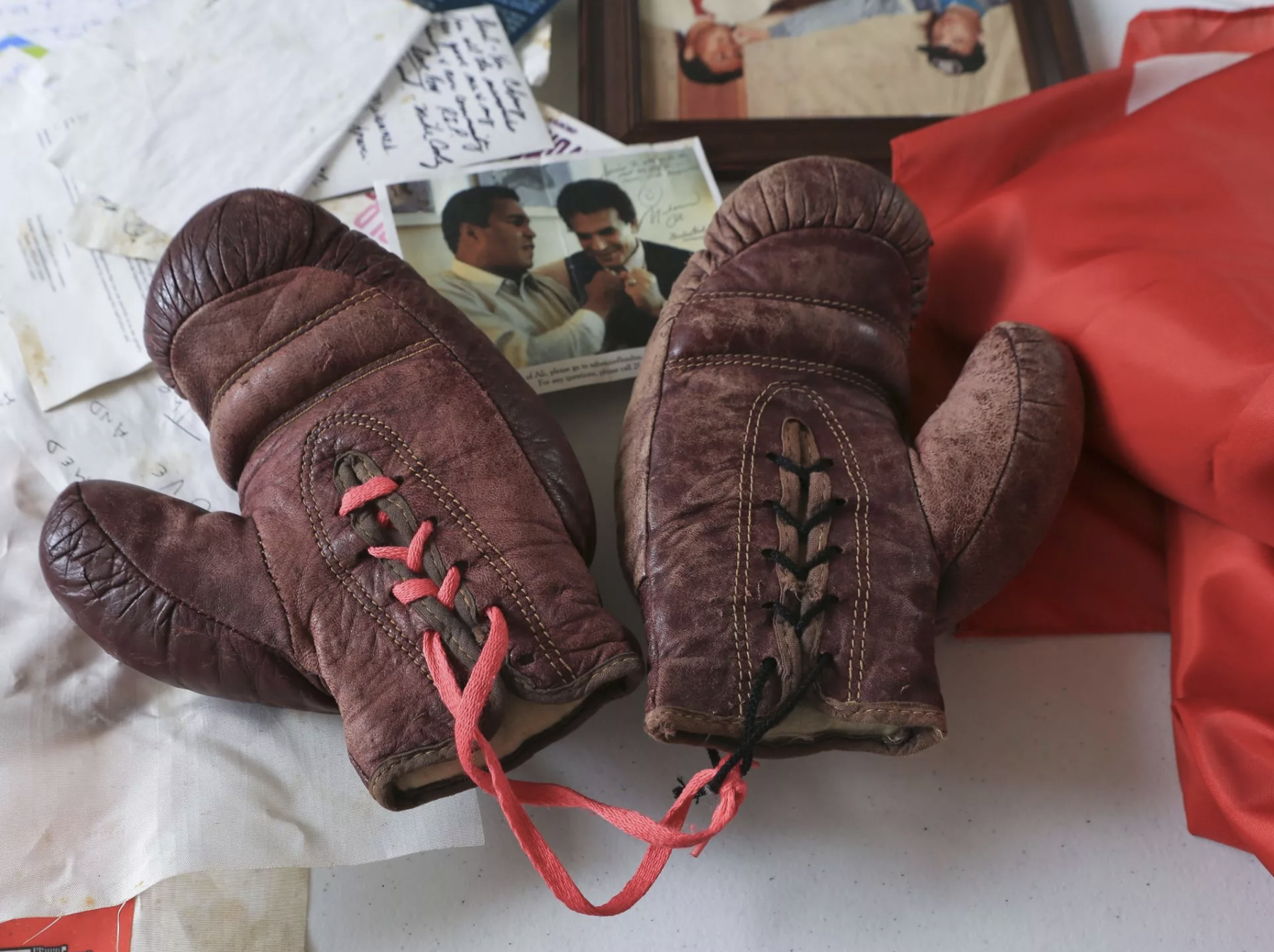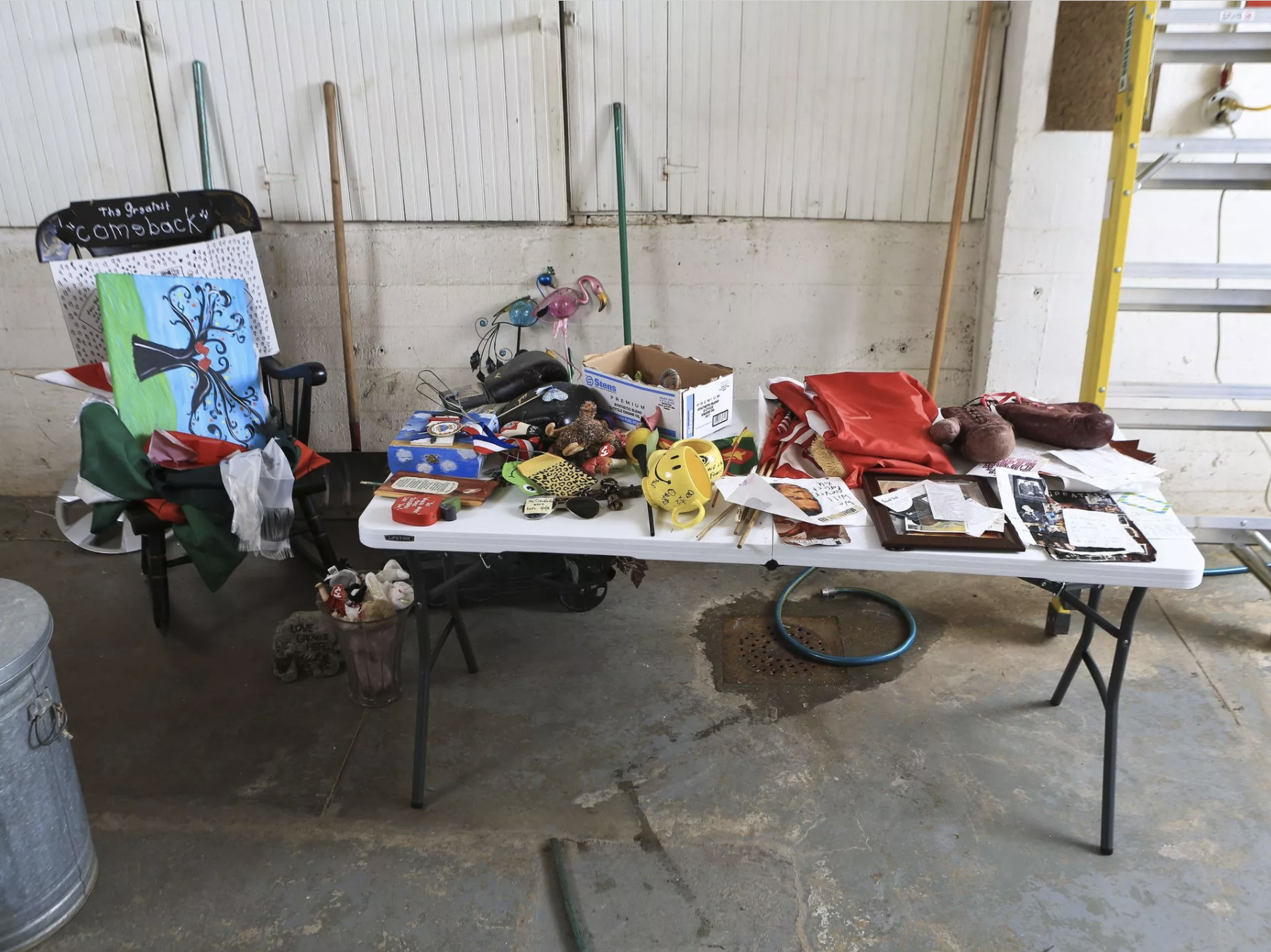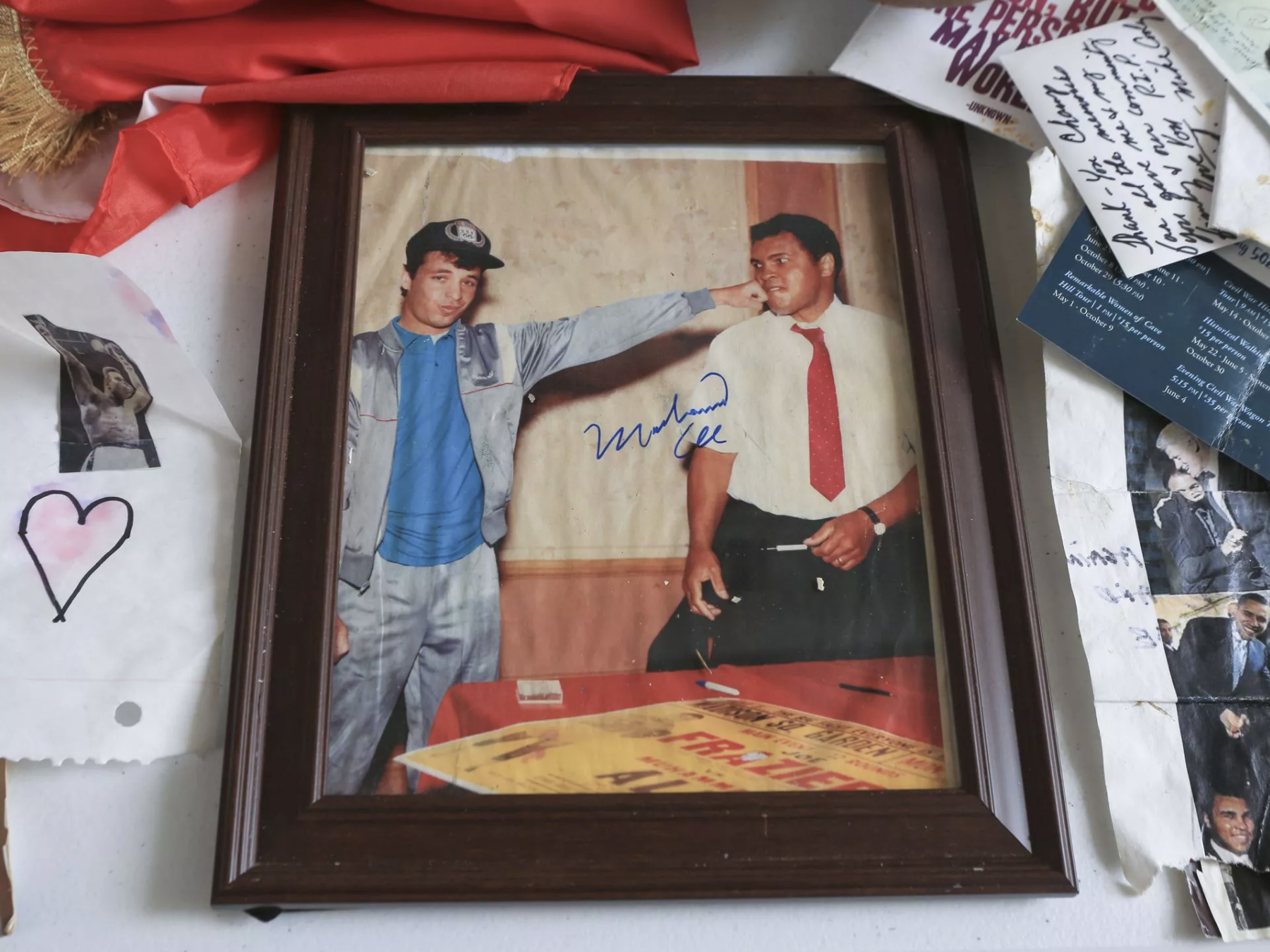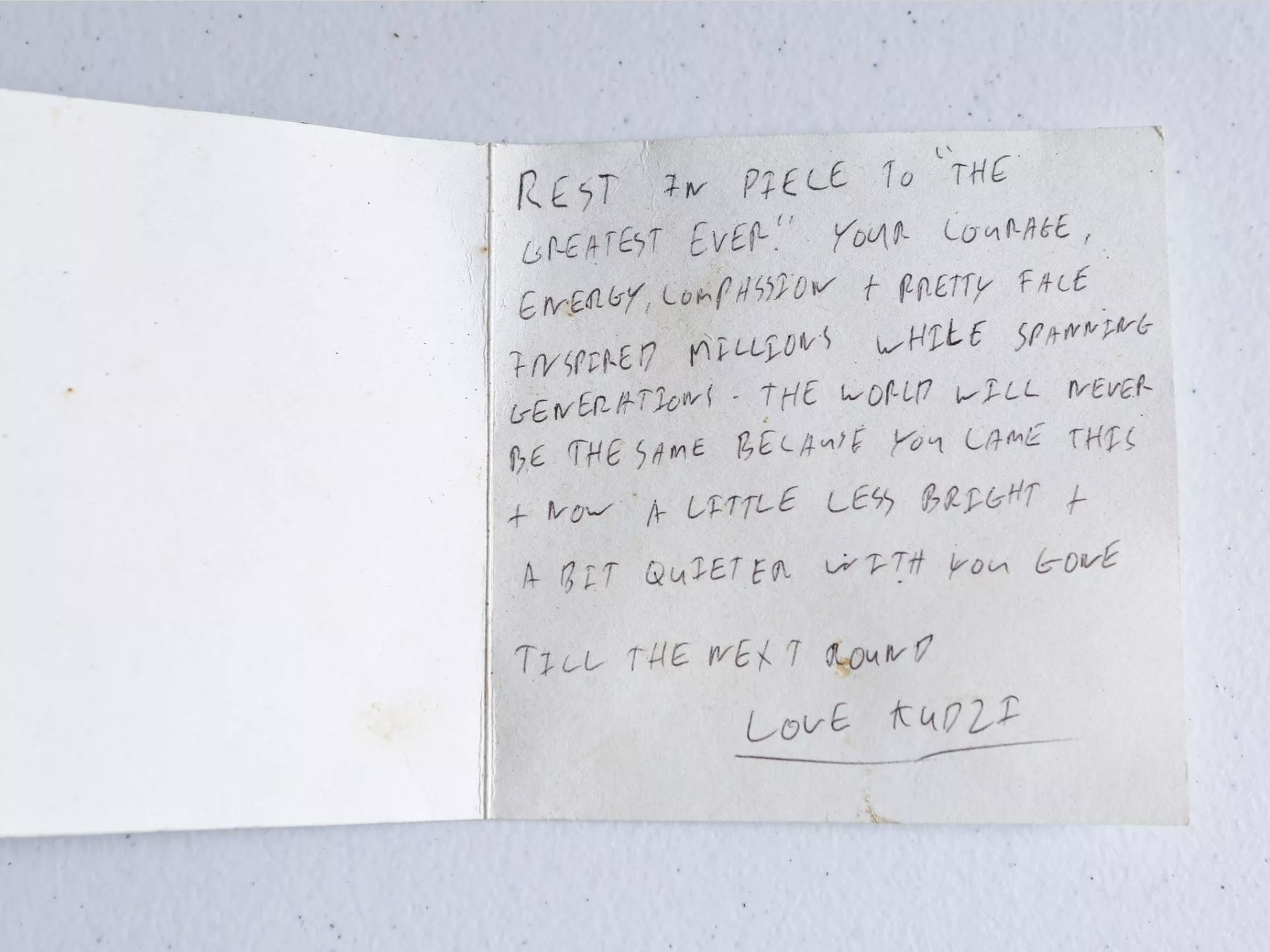Graveside gifts show Ali's undying influence
Fans of Muhammad Ali have left dozens of momentos, flowers and pictures of the late boxing and humanitarian icon at his grave at Cave Hill Cemetery. The cemetery caretakers remove items every few days per the request of Ali's family but have stored the collection in the basement of the cemetery's main office. (Photo: Matt Stone, The C-J)
FROM A ROCKING CHAIR TO A CHAMPIONSHIP MEDAL, MOURNERS HAVE MARKED MUHAMMAD ALI'S GRAVE WITH HUNDREDS OF MEMENTOS
It had only been two days since Ronald Ewing lowered the casket of Louisville’s most famous son into his grave.
During that early morning shift in June, the interment crew supervisor pushed a wheelbarrow full of topsoil down the hill in Section U at Cave Hill Cemetery. With his shovel and rake, he prepared to fill in a dip where the grave had sunk.
Though no headstone marked Muhammad Ali’s final resting place, boxing gloves and flowers, photos and flags covered the sod. What stood out, at the head of the grave, was a black, wooden rocking chair affixed with a hand-drawn illustration in Sharpie. A stick figure stood at center ring surrounded by fans, holding aloft a sign that read: “The Greatest Round” with backward letter e’s.
Alex Mosham of Huntington Beach, Calif., flew cross country to pay his respects to Muhammad Ali at his gravesite in Cave Hill Cemetery on Oct. 18.
(Photo: David R. Lutman/Special to The CJ)
Ewing had never seen anything like it. In his seven years burying the dead, he’d seen love notes and quarters, quilts and crosses. But never a rocking chair. Certainly, it meant something to someone.
“Maybe it was something for him to rest in,” Ewing surmised. “It could have been for a family member so when they visit the grave they have something to sit in.”
He pondered the meaning of the mystery mourner’s gift.
“You sit there and rock and think of old times,” Ewing said. “ … ‘Now we’re both resting. I’m resting in the rocking chair. And he’s resting in his grave.’ ”
The story of the influence Ali had on mourners’ lives is told by the things they left. They convey who he was to them: A father figure, a teacher. A fellow Muslim, a revered athlete. A poet. And a man of the world.
Now, Ali’s headstone is polished and set, and in keeping with Islamic tradition, nothing grandiose. A granite ledger, adorned with the former heavyweight champion’s own words, covers his grave, not for religious reasons, but because his widow couldn’t abide the thought of people stepping on him.
Those words to a British journalist in 1972 for how he wanted to be remembered became known as his recipe for life. Not money, not physicality, and not a pretty face, but this:
“He took a few cups of love. He took one tablespoon of patience, one teaspoon of generosity, one pint of kindness. He took one quart of laughter, one pinch of concern, and then he mixed willingness with happiness. He added lots of faith, and he stirred it up well. Then he spread it over a span of a lifetime, and he served to each and every person he met.”
The benches, black granite shipped from Africa, where he secured his stunning 1974 victory over George Foreman – the Rumble in the Jungle – flank his ledger, inviting admirers to come and stay a while.
That’s how Lonnie Ali wanted it. She’s always known Muhammad belonged to the world.
“Sit down beside him and talk with him,” she said. “Spend some time with him. I hope when they spend time there they are inspired by Muhammad’s life and what he stood for. And maybe they can release some of the burden they’re carrying.”
And come they have. Streaming by the thousands at first. Still, now, 100 a day.
Groundskeepers and security guards have watched mourners’ pilgrimage to his grave. They’ve snapped photos with celebrities and held people as they wept – some who knew Ali and strangers surprised at their emotional reaction.
And each day, they collect the mementos and place them in a nearby gardener’s shack before they’re carried to the office basement where they’ll stay until a plan is developed for how to archive them and eventually share them in a special exhibit at the Muhammad Ali Center. They’ll be combined with similar mementos left the week following his death at the center’s plaza.
Fans of Muhammad Ali have left dozens of momentos, flowers and pictures of the late boxing and humanitarian icon at his grave at Cave Hill Cemetery. The cemetery caretakers remove items every few days per the request of Ali's family but have stored the collection in the basement of the cemetery's main office. (Photo: Matt Stone, The C-J)
The cemetery has no timetable for how long they’ll collect things. It could be a year, maybe two.
For now, down in that basement, the pile of keepsakes fits on a 5-foot-long table. And the collection grows by the day.
“When I first started going, shortly after he was buried, it (his grave) was covered,” Lonnie Ali said. “People came and brought all kinds of personal things – pictures and mementos, and tributes and flowers. One woman even went as far as to go get dirt from his mother and father’s grave and mold something out of it and put it on Muhammad’s grave.”
People’s love for Ali is a testament – even after his death – to his humanity. He was big in stature, a global icon but approachable. Maybe that’s why they’re still looking for an audience with him, even in memoriam – even from halfway around the world.
The things they left are as unique as the flags of their countries – Turkey, Canada, Bangladesh – and the names of their hometowns. Their trinkets, knickknacks and novelties are testimonies of his imprint on their lives.
On the table, a pair of boxing gloves laced with an old shoe string sat near a 1st place medal from the 2016 National Trampoline Championship in Knoxville.
There were poems, some store bought on wood, others typed and original – “Why God Made Fathers.” “The world needs more teachers like you!” — certainly all a nod to Muhammad’s poetic prowess. Butterflies and bees found a place in rhyme.
There were collages and magazine cutouts of the Louisville Lip clearly constructed by a child’s unsteady hand, one with the message: “We will never forget you.” And signed with a heart.
And then there were the letters. Written on the back of hotel key card holders, Courtyard Marriott stationary and an old receipt perhaps dug out of the glove box.
“I hope when (visitors) spend time there they are inspired by Muhammad’s life and what he stood for. And maybe they can release some of the burden they’re carrying.”
And on a Cave Hill comment card: “He who is not courageous enough to take risks will accomplish nothing in life. Love, Stephen, Katrina, Henry and Eliot. We will miss you, champ. The Doodas- Durham, NC. 6/14/16.”
Others from Maine, Oklahoma and Mississippi.
“Love and respect for the true people’s champion. Gone but not forgotten. You will be greatly missed. From Mohammad Hanif and everyone, Oxford, England.”
A German flag with the message: Hohenlimburg trauert um den Grobten. Or Hohenlimbur mourns the greatest.
And this, at the end of a long letter signed simply Mahmut: “May Allah grant you forgiveness for any shortcomings and reward you greatly for all the good things you did in life.”
Ali, the man who converted from Christianity to Islam and defied any label, may have been the most well-known Muslim in the world in modern times. He was cherished in the Middle East and other Islamic countries because people were proud of the way he represented the religion, Lonnie Ali said.
His global popularity was evident in their words — a handwritten one in Arabic that said Muhammad was alive in the hearts of all Tunisians and Italians; from a fellow Muslim who never met Ali in this life but hoped to one day in Jannah (heaven). Inshallah; and in prayers screen-printed on a shroud.
Fans of Muhammad Ali have left dozens of momentos, flowers and pictures of the late boxing and humanitarian icon at his grave at Cave Hill Cemetery. The cemetery caretakers remove items every few days per the request of Ali's family but have stored the collection in the basement of the cemetery's main office. (Photo: Matt Stone, The C-J)
And then there were those objects that defied explanation, perhaps left in a moment of inspiration or out of a desire to say I left something at his grave.
A Post-It taped to a pair of sunglasses with a note: “The Crawfords were here. 6/21/16.” An old wash bucket. A yellow smiley face mug inscribed with a marker. Beanie Babies. A lullaby munchkin doll from the Wizard of Oz. Two fly swatters. Glass flamingos. A wooden purse box. And a painting of two birds in a tree.
Ali’s ability to reach people of every kind was the beauty about him, Lonnie Ali said.
“Common, everyday people knew they could walk right up to him, ask for an autograph, introduce themselves, share a story with him, share something personal and light-hearted and that he would be receptive,” she said. “He never turned his back on anyone.
“A lot of kids walk up to athletes or celebrities and want an autograph or something, and the person acts as if they are put out by that. Never Muhammad. Muhammad was never like that.”
On a recent fall afternoon, Lonnie Ali told a little-known story about how Muhammad used to love drawing pictures of his fights – always with a black Sharpie and always with him in the ring with Joe Frazier.
“What was important was that the crowd attended,” she said. “Which he made with little dots. Every dot represented a person. He did it until he couldn’t get another dot on that page. It was standing room only. Actually, it was breathing room only.”
So the rocking chair at his gravesite with its Sharpie-drawn image of a stick figure at center ring is particularly notable. Not for what’s in the ring but for the crowd. In that drawing, though, the fans weren’t dots but hearts.
Muhammad said that if people would love each other the way they loved him it would be a much better world, Lonnie Ali said.
And he was right.
Fans of Muhammad Ali have left dozens of momentos, flowers and pictures of the late boxing and humanitarian icon at his grave at Cave Hill Cemetery. The cemetery caretakers remove items every few days per the request of Ali's family but have stored the collection in the basement of the cemetery's main office. (Photo: Matt Stone, The C-J)
This story originally published in the Courier Journal.

